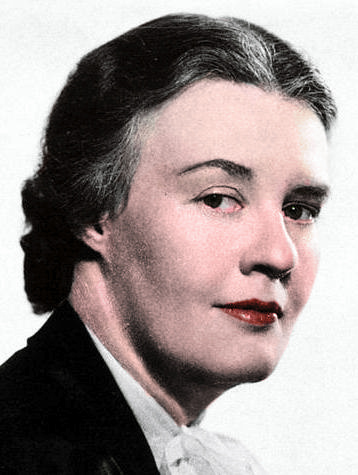Reading Eagle (May 14, 1941)

DOROTHY THOMPSON SAYS –
The Abbey – The Museum – The Commons
In order to have resonance in the world today, words and deeds have to be in some proportion to the events. They have to be somewhat adequate. Mr. Hoover’s speech was nowhere near the events. It seemed to me to have been uttered from some other time, from some other planet, and this in spite of several references to facing “hard facts.” It seemed to me that hard facts were nowhere in Mr. Hoover’s picture.
It happened that Mr. Hoover’s speech coincided with news of the bombing of Westminster Abbey, the British Museum, and the House of Commons. The three objectives represent the very heart of western civilization. No three structures in the world more completely embody the dignity of Man: the Abbey; the Museum; the Commons.
The Christian Church and tomb of heroes, sages, statesmen, poets. The world’s greatest library; receptacle of the wisdom of ages; record of the timeless thoughts of Man; fountain to which the thinkers of all countries, in all languages, have repaired, open to all, at the service of all; the Commons, symbol of the longest most uninterrupted, and, on the whole, most dignified and enlightened experience of popular government that the world has ever known.
When the Nazis burned the Reichstag, the world should have leapt to arms. For in all the wildness, there is always a certain pattern, ominous, symbolical, portentous. When they set fire to synagogues, they made a little trial arson on the abodes of the human soul. Soon, and inevitably, it would be the Abbey. When they burnt the books in the public square – just a few years ago – soon, soon, the world should have known, it would be the Museum.
The Abbey, the Commons, the Museum are not just buildings. They are history – the history of the human soul and the human mind, struggling upward, ever upward, toward light, toward freedom, toward decency, toward knowledge, toward grandeur.
They are immense symbols of humanity’s piety, faith and hope.
They are beyond the present and beyond England. They belong to mankind – to the past – to the future.
They are the link between what Man, for thousands of years, has considered good and worthy to be praised and the better and truer tomorrow which he must build.
These are what are falling, falling, falling in the moonlit night, or falling in the blazing light of the fires of hell. Falling is the temple of Man’s soul, falling are the monuments to the great dead that remind us constantly of the sacrament of Life, falling in the careful structure of beauty and of wisdom, falling are the parliaments of Man. Falling is western civilization. A world is passing away, in wantonness o’erthrown. Wanton. Senseless. Insane. Idiotic. Evil. Even trivial.
Yes, even trivial. Trivial this childish, barbarian, crazy assault upon the human race. A few boys with some machines and explosives press buttons, and where are you, Shakespeare, and where are you, Blake, and where are you, oh, long, deep, memorable history of Man?
This war is to stop the destroyers of civilization in their tracks. To defend the Abbey, the Museum, and the Commons. To see to it that, though they lie in rubble, and the very dead are exploded out of their tombs into the light of arson brighter than day, and the records of 1,000 searching brains are mingled with the ashes of a surprised child’s hair, and the representatives of the people must meet under the sky of a roofless hall – to see to it that nevertheless: The Abbey stands, the Museum lives, the Commons meet. Because the human will cannot be broken.
It is better to say nothing at all, perhaps. To stand still in deepest awe. To look… to gaze hard, not to avert the eyes – not for a moment – to stare, to think, to realize.
To realize a world without the Abbey, the Museum, the Commons.
A world without aspiration, love, reverence, wisdom, freedom.
A world of barracks and prisons, and factories, and slaves, where wisdom is the Völkischer Beobachter, and The People as incorporated shrieking hyena applauding itself with monotonous animal-like cries.
It is not an adequate comment that Britain cannot defeat the Nazis. If not, what then? It is not an adequate comment that we must send more and more materials to Britain to help her defeat the Nazis but we must not see to it that the goods get there, because getting them there will mean that our ships will be shot at. It is not an adequate comment that we can do more for Britain by letting the goods go to the bottom of the ocean than by risking our skins.
That is sophistical argument. It is not candid, and it is not true. There is a tough-and-go chance that we may save enough civilization to build another world on, but no chance at all unless we risk our skins.
And our lives, fortunes, and sacred honor.
And our savings, wages, and standard of living.
The cross, the book, the gavel. Aspiration, inspiration, order. In one word: Humanity.
You are worried, Mr. Hoover, about post-war bankruptcy. You mean our savings will be gone.
And if Hitler wins?
What bankruptcy will that be? What are savings? Are they in the bank?
On in the Abbey, the Museum, and the Commons?